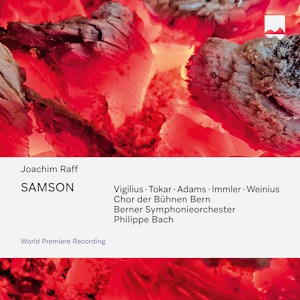
Joachim Raff (1822-1882)
Samson (1858)
Magnus Vigilius (tenor) – Samson
Olena Tokar (soprano) – Delilah
Robin Adams (baritone) – Abimelech
Christian Immler (bass-baritone) – Oberpriester
Michael Weinius (tenor) – Micha
Choir of Bühnen Bern
Bern Symphony Orchestra/Philippe Bach
rec. 2023, Stadttheater Bern, Switzerland
Full libretto in German, French and English and Notes
Schweizer Fonogramm SF0016 [3 CDs: 184]
Joachim Raff was a mid-19th century composer of Swiss birth who had the good fortune to work with Franz Liszt on the world premiere of Wagner’s Lohengrin in Weimar in 1850. Raff seems to have been profoundly affected by his experience with Wagner’s great music drama. He wrote a treatise about Wagner’s opera in which he both celebrated its composition but also listed numerous areas where he felt Wagner had gone wrong. Raff’s own opera Samson had a long genesis, occupying him from 1851 to 1857; the result was an opera which at times bears resemblances to Lohengrin, especially in its more public scenes. However, it also shows an affinity with French Grand Opera of the day. (as is noted in the accompanying booklet). Raff’s music is richly-textured and often interesting. He reveals himself to be an orchestrator of no small talent. There are times when his opera bears a marked resemblance to the music of a German composer from the same period, Karl Goldmark, who’s opera Die Konigin von Saba (The Queen of Sheba) had great success around the world during the late 19th century. Raff’s music for Samson is often quite beautiful, just one example being a striking prelude for the Third Act in which a solo violin in supported by the orchestra in a similar manner to the Méditation from Massenet’s Thaïs. Unfortunately for all of the skills that Raff lavished on Samson he was unable to get the opera staged anywhere. It was Saint-Saëns opera Samson et Dalila that would achieve lasting fame after its 1877 premiere in Weimar, ironically the same city for which Raff had intended his opera. Raff’s Samson was finally given its world premiere in Weimar in 2022. This recording derives from the first Swiss production which occurred a year later.
The first thing to mention here is that the sound of this release is really splendid. The Swiss team of engineers has produced a superbly realistic sound filed with a natural concert hall ambience. A good thing too because the Berne orchestra and chorus are a highly accomplished group who need fear no comparison with the more reputed organizations from Berlin and Vienna. Conductor Philippe Bach is deeply engaged with the music and he energizes it with distinction. Page after page of the score unfurls with meaning and drama intact. The French style of grand opera that Raff mimics tends to be a sprawling affair with concentration lagging at times. That is not the case with Bach and his team. This recording gets very high marks then for the instrumental side of things.
The team of vocalists is very much a hit and miss event unfortunately, with more misses than hits. Olena Tokar’s Delilah starts out well enough. Her soprano has a warm and inviting timbre in the middle and lower ranges; however, it soon becomes apparent that her upper range develops a vocal flap which is stressed and unpleasant; the proximity of the microphones do no favours for her or the listener. This is too bad because she is a deeply engaged performer who works really hard to present her role in the best light possible.
Magnus Vigilius’ Samson benefits from a precise, bright-edged tenor who has the ability to make heroic sounds. However; he is consistently plagued by intonation difficulties, often in the middle range, which cause concern and lessens the stature of his portrayal of the Israelite leader.
In the lesser role of Micha, Michael Weinius has a rather hectoring sound, which soon becomes tiring to one’s ears. Another singer whose unsteady tone causes distress is Robin Adams as Abimelech. Raff gives this character much more stage time than Saint-Saëns did. Adams is good at highlighting the complex motivations of this Abimelech but the voice that emerges from the sound system is basically unattractive.
The one singer who comes off with honours here is Christian Immler’s performance of the High Priest. His voice has a gravel-like texture that is not unlike a lighter version of the late Theo Adam. Adam’s had a very distinctive sound that could not be confused with any other singer. Immler’s commanding presence shows great promise here, although, as of yet he doesn’t present the unique vocal personality that marked Theo Adam’s style. Once again Raff makes the High Priest less two dimensional that Saint-Saëns did so Immler has more chances to make an effect than he would if he were Saint-Saëns ’ Grand Prêtre.
Raff’s Samson is a wholly absorbing opera and deserves the chance to be heard and seen again. I would rate it as roughly equal to Massenet’s Esclarmonde but without the silly magical elements of Massenet’s opera. While Raffs opera is not likely to replace the Saint- Saëns work (his greatest operatic achievement) any time soon. It is good to have this important but vocally flawed document of an opera that should have earned its day in the sun long before this.
Mike Parr
Previous review: Jonathan Woolf (September 2024)
Availability: Schweizer FonogrammOther Cast
Marjam Fässler (mezzo-soprano) – Oberpriesterin
Christian Valle (bass) – Von Askalon
Bareon Hong (tenor) – A Prison Guard
Katharina Willi (soprano) – A woman of the people


















